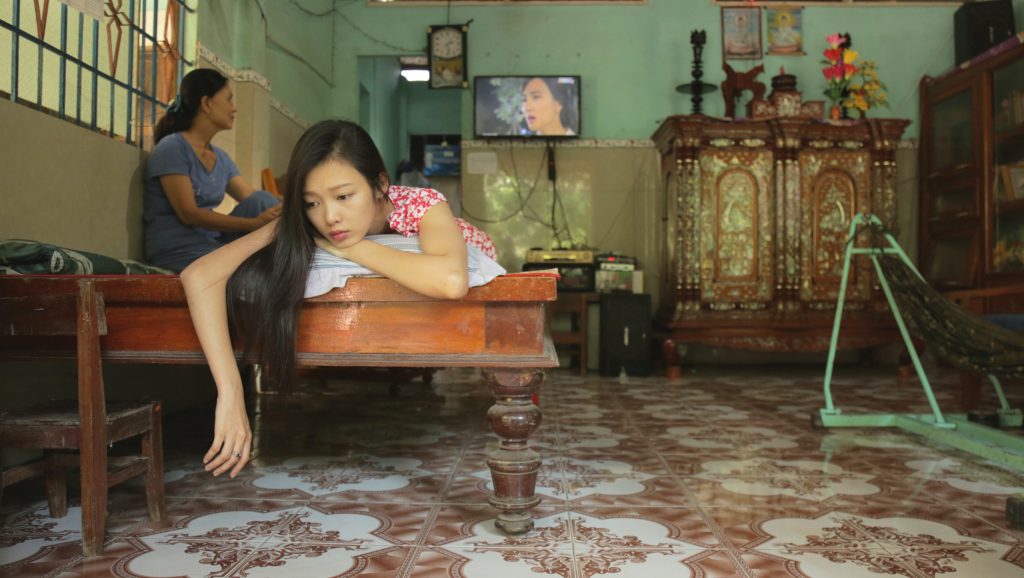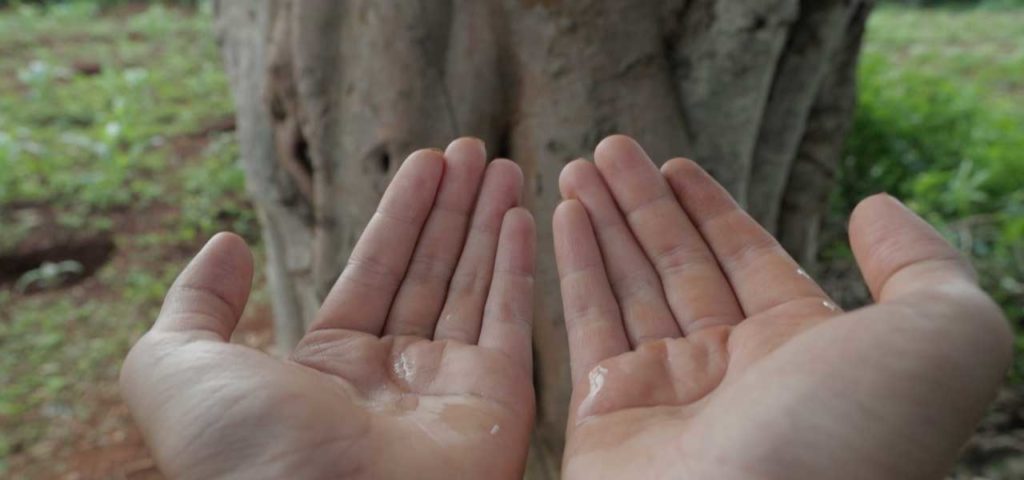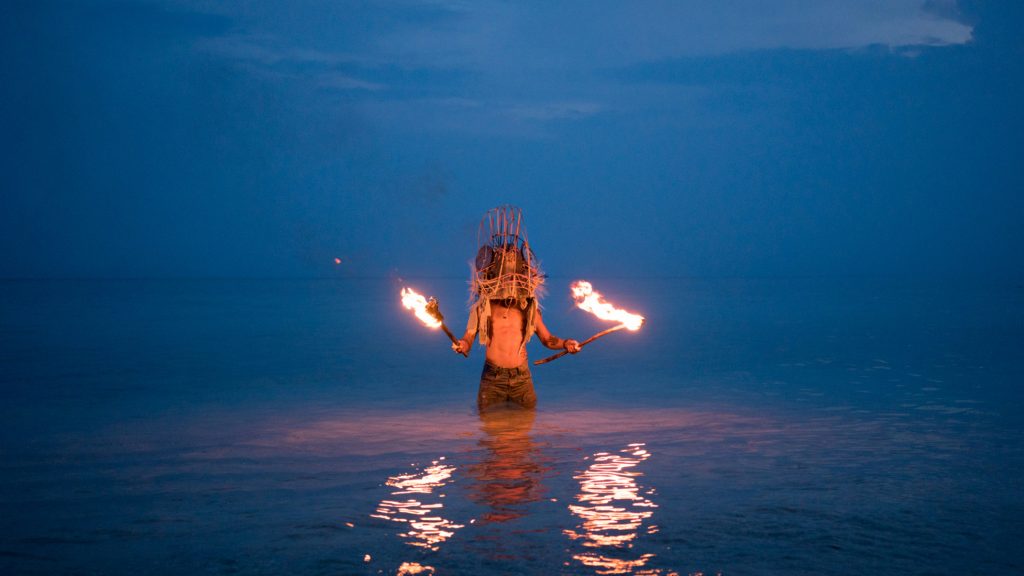For English, please scroll down.
時間:2018.01.20 (Sat.) 15:00、2018.01.27 (Sat.) 15:00
地點:台北當代藝術中心,台北市保安街49巷11號(
放映影片:
潛露水 | Trương Quế Chi & Đỗ Văn Hoàng | 15:00-15:40
平日光 | Lêna Bùi | 15:50-16:40
島 | Tuan Andrew Nguyen | 16:50-17:30
此《走私》計畫之首場放映聚焦在近年於越南活躍的當代影像創作。作品呈顯出某種在個體、民族、物種、土地、神話、
(本放映活動皆以英語字幕放映)
《潛露水》
Trương Quế Chi & Đỗ Văn Hoàng
2017 | 彩色、有聲、越語發音、英文字幕 | 40分鐘
《潛露水》是一部關於越南中部高地的環境、景觀、
此作是由越南藝術團體「藝術勞工」(Art Labor)發起的創作計畫之一部分,由兩位電影製作人:
(圖片由Art Labor與藝術家提供)

《平日光》
Lêna Bùi
2016 | 彩色、有聲、越語發音、英文字幕 | 48分鐘
江在夏天裡去前江拜訪梅姨,
(圖片由藝術家提供)
《島》
Tuan Andrew Nguyen
2017 | 彩色、立體聲、英文字幕 | 42分鐘
《島》是全程於比農島所拍攝的短片,
(圖片由藝術家提供)
Time: 2018.01.20 (Sat.) 15:00, 2018.01.27 (Sat.) 15:00
Venue: Taipei Contemporary Art Center, No. 11, Lane 49, Baoan Street, Taipei (MRT Daqiaotou Station)
Screening list:
Drowning Dew | Trương Quế Chi & Đỗ Văn Hoàng | 15:00-15:40
Flat Sunlight | Lêna Bùi | 15:50-16:40
The Island | Tuan Andrew Nguyen | 16:50-17:30
The first screening section of So Far, So Right project features the contemporary moving-image practices in Vietnam. The selected works reveal a certain state of trans-subjectivity, which intertwines the segmented and diaspora experiences of contemporary society,through crossing the multiple boundaries and regimes between individuals and the society, ethnic and species, land and mythology, history and memory.
Drowning Dew
Trương Quế Chi & Đỗ Văn Hoàng
2017 | Color, sound, Vietnamese with English subtitles | 40 min
“Drowning Dew” is an artwork that, depending on the occasion, can be considered as series of experimental films if it is set up as one-monitor consecutive screening, or as video installation with 6-channel projected structure.
The film is a critical yet poetically fictional depiction of rapid changes of environment, landscape, human habits and society in Central Highlands of Vietnam. The film series contain 6 mini pieces that are loosely based on Jrai myth of posthumous metamorphosis. The myth acts as an open narrative framework, and as allegory of inevitable transformations of the area during this modernization and industrialization, which occur also in different regions in Southeast Asia.
This is a work of Art Labor and created in collaboration with 2 filmmakers Truong Que Chi and Do Van Hoang, who have individually conducted researches on landscape, religion, ethnography and aesthetics in Central Highlands for long time. This work will premier at Centre Georges Pompidou in October 2017 within Cosmopolis exhibition.
Flat Sunlight
Lêna Bùi
2016 | Color, sound, Vietnamese with English subtitles | 48 min
Giang visits her aunt Muoi in Tien Giang for the summer to give her mother personal space and time to sort things out.
The slow rhythm of countryside life, children’s games, and close relationship within the neighborhood help Giang forget about her personal troubles and the hot Mekong sun. Seeing her 60-year-old aunt constantly busy with farm work, Giang decides to help out.
The film develops through Giang’s perspective, weaving documentary footages with a fictional storyline. Through Giang and aunt Muoi’s developing relationship we get a sense of the slow and drawn-out rhythm of life in the rural South of Vietnam, the close contact between human and animals, the switch from traditional methods to reliance on industrial feed, concerns surrounding food safety, and the perception and interests of a typical farming household in the Mekong Delta. The film also introduces a new angle into the relationship between human and animals, and the inseparable ties between life and death.
The Island
Tuan Andrew Nguyen
2017 | Color, sound, stereo, English subtitles | 42 min
The Island is a short film shot entirely on Pulau Bidong, an island off the coast of Malaysia that became the largest and longest-operating refugee camp after the Vietnam War. The artist and his family were some of the 250,000 people who inhabited the tiny island between 1978 and 1991; it was once one of the most densely populated places in the world. After the United Nations High Commissioner for Refugees shuttered the camp in 1991, Pulau Bidong became overgrown by jungle, filled with crumbling monuments and relics.
The film takes place in a dystopian future in which the last man on earth – having escaped forced repatriation to Vietnam – finds a United Nations scientist who has washed ashore after the world’s last nuclear battle. By weaving together footage from Bidong’s past with a narrative set in its future, Nguyen questions the individual’s relationship to history, trauma, nationhood, and displacement.
關於藝術家
About artists


